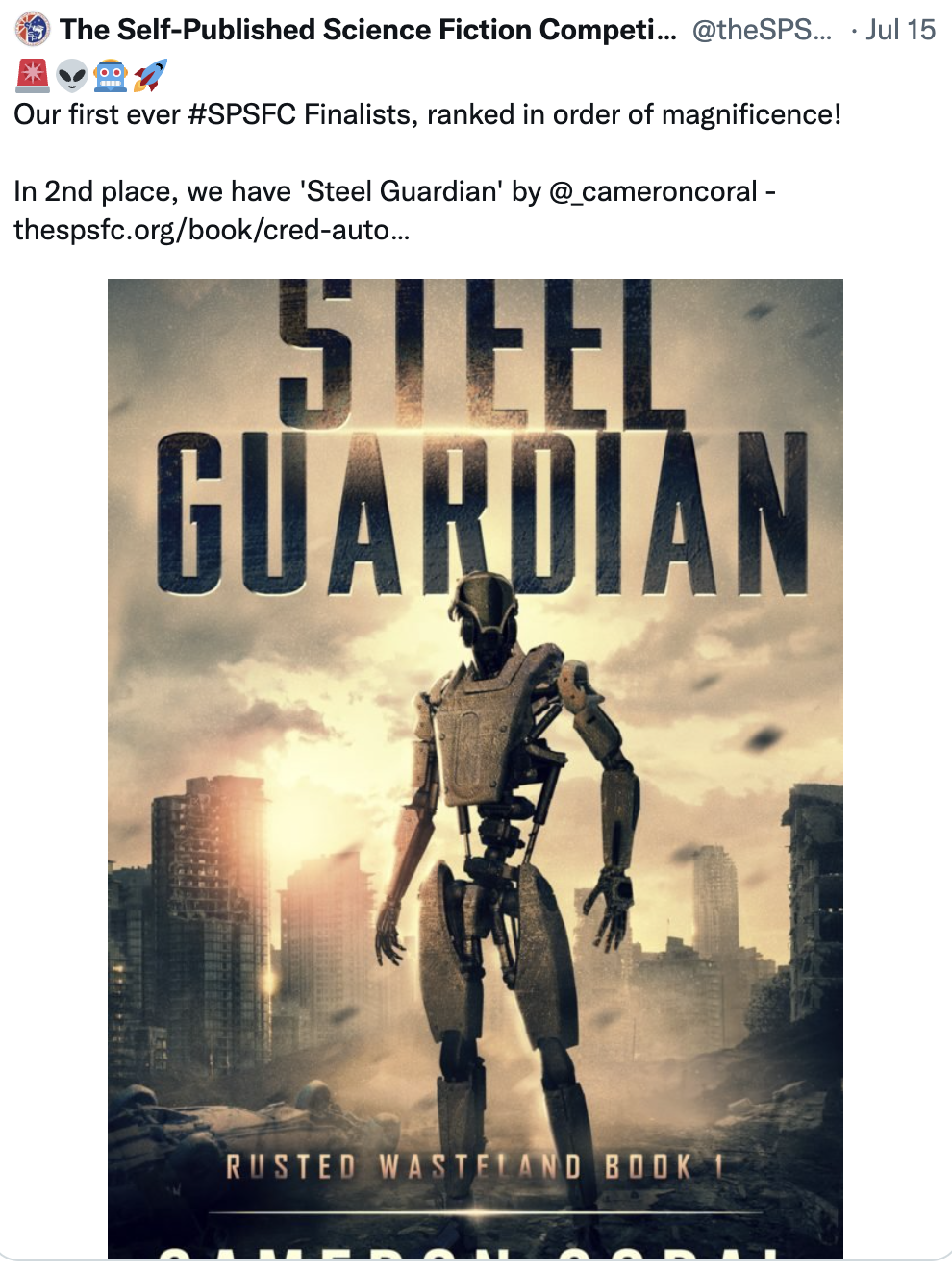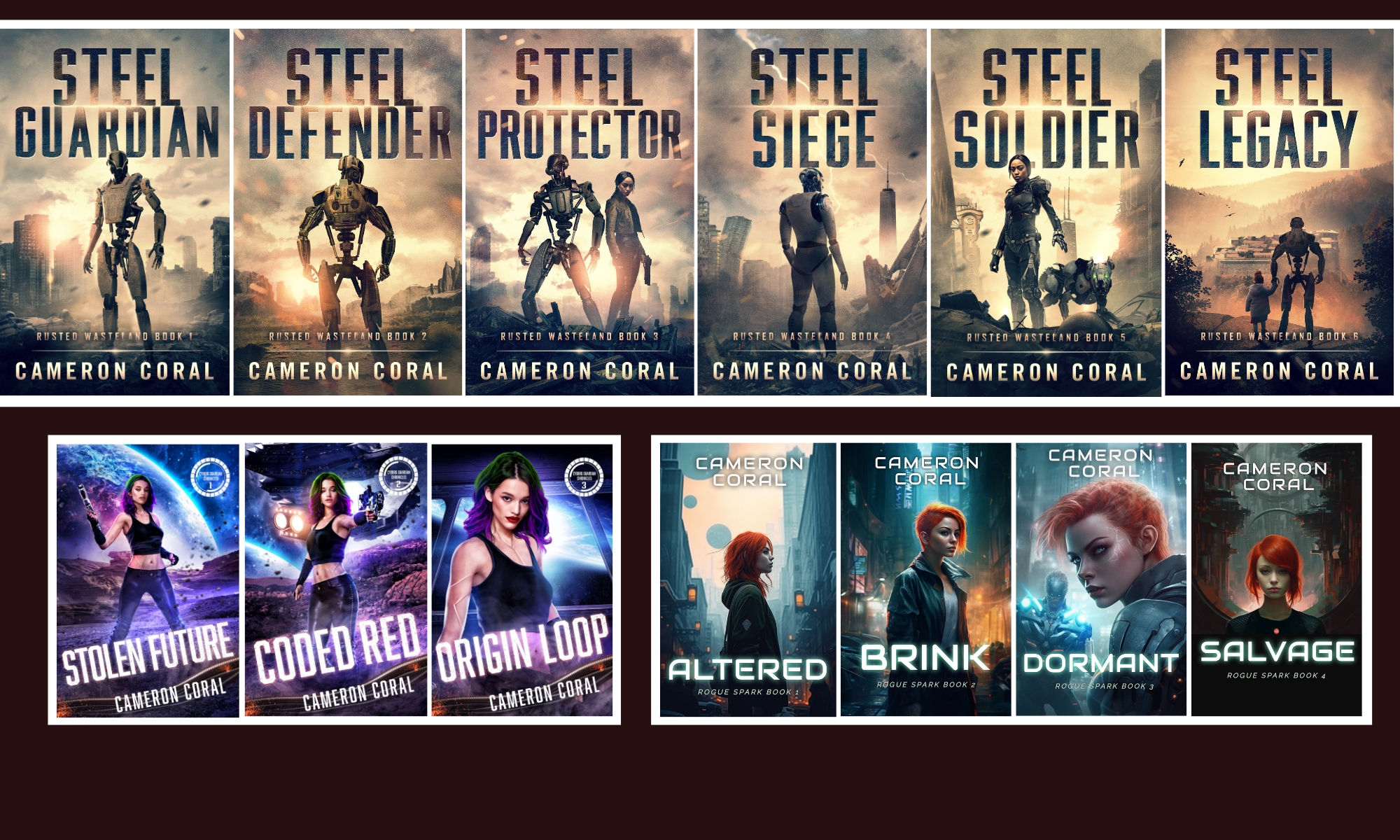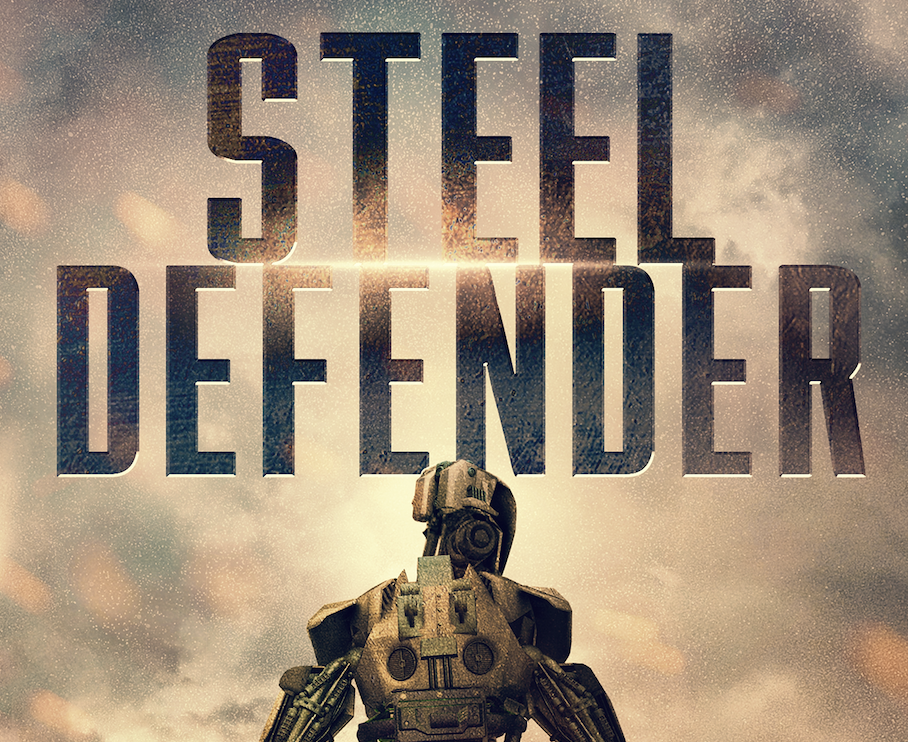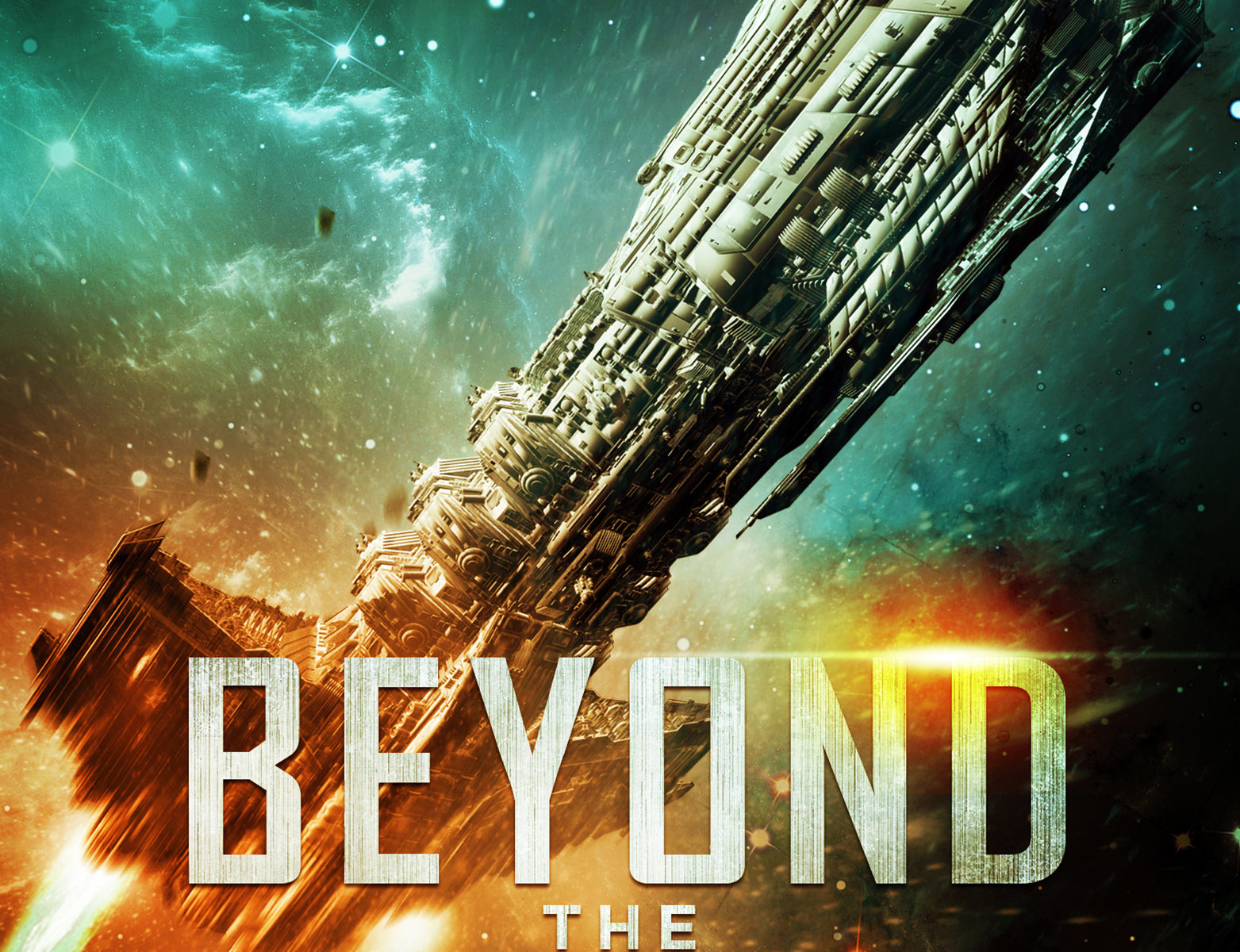Steel Guardian (Rusted Wasteland Book 1) was a finalist in the 2021 Self-Published Science Fiction Competition #SPSFC
It finished 2nd overall out of 300 books!

I’m thrilled about the kind reception to Block’s adventures and am hard at work writing Book 4. Here’s a preview of Chapter 1.
Rusted Wasteland Book 4 – Chapter 1
The jet’s interior needed a good scrubbing. Block, rotating his wrists to suppress his programming urges, would have been happy to accommodate, but there were more urgent matters. At a cruising altitude of 20,000 feet, Maxwell piloted the plane after a bumpy takeoff from Chicago. Cybel Venatrix occupied the co-pilot chair, looking regal with her newly implanted SoldierBot legs that reached the floor. Block perched on the edge of his seat behind them in the first passenger row. His primary concern was getting the plane and everyone on board safely to New York City where Wally had been taken by Mach X’s SoldierBot army. How exactly to go about rescuing her was still a puzzle to his well-worn, humming circuitry.
Through the circular window next to him, the thin, night air stretched into black oblivion. Less than two hours ago, they’d waged a battle along Chicago’s abandoned O’Hare airport runways. With Nova’s help, they’d beaten Shane and his followers. She’d stayed behind, promising to win back the army of human rebels and to keep fighting against Mach X’s forces in Chicago. Block hoped Nova had a chance to get some sleep. He knew better than anyone how cranky she got when she missed out on her slumber.
A rattling like a train coming off its tracks came from the rear. Oxford’s massive Mech body stretched the limits of the 15-passenger seat jet that had once flown the members of the Beaky Breads Company as evidenced by the painted logo on the plane’s exterior. The cheery blue and yellow design was peeling off—remnants from the peaceful past—abandoned for over a year since the Uprising had destroyed modern society, killed most everyone, and sent surviving humans into hiding.
In the front, Maxwell slammed a fist against the plane’s dashboard. “I can’t see jack out there.”
For a moment, Block wondered who the heck Jack was and why on earth Maxwell would be looking for someone while they were flying, but then his hospitality module kicked in, rather late— “jack” was a slang expression used by humans, one that Maxwell had picked up from the workers at his former factory.
“You idiot.” Cybel flicked on a control gauge and pressed two buttons that illuminated a lit-up display dash that showed the plane’s relation to the terrain below. “You said you flew before.”
Maxwell’s square metal shoulder sockets squeaked as he shrugged. “A flight simulator that a couple of the Factory loaders rigged up. That counts, right?”
Flat on his back, with his twelve-foot-tall metal frame wedged between seats, Oxford grumbled. Block rose from his vinyl-covered seat—a horrendous shade of blue that showed dust—and crouched next to his large friend. “How are you doing?”
“Never mind.” Oxford swiveled his head to see Block. “Keep those two focused on landing us in one piece.”
“Roger that.” Block strode to the plane’s mid-section, pausing to check on the other passengers in his misfit crew. Across a long padded bench, his oldest friend, Vacuubot was perched next to G9—the SoldierBot that Block had hacked and succeeded in winning to their side. “Is everything—”
Vacuubot relayed an instantaneous reply to Block. The two-foot-wide disc-shaped flying robot’s pings could only be interpreted by Block, and no one was sure why. I’m monitoring G9 for any signs of reverting to Mach X’s control.
“Okay.” Block supposed that was a good idea, and it was one he hadn’t thought of himself. “Carry on.” For some reason, Oxford and the others had appointed Block the leader of the group. There was no logic proposed for the decision, no rationale provided, and Block couldn’t understand why they’d put the weakest link—a lowly CleanerBot such as he was—in charge of anything other than sweeping.
Beside the imposing SoldierBot and weaponized Vacuubot, two other robots rested on the long benches. Spoon was a Medical HelperBot that they’d found in Mach X’s Chicago tower. Spoon had overseen medical administration for the babies and children whom Mach X had abducted. Spoon was the last among them to have seen Wally. Then there was Forge—a robot they’d found abandoned and in need of help while navigating the El train tracks underneath the streets of Chicago.
Cybel flipped a lever and shifted in her seat toward Maxwell. “Listen up.” She pointed to a gauge on the dash. “That’s your altitude.” She pointed to another digital output. “That’s your speed, and that’s your engine power.” Maxwell tilted his head as if studying or recording the lesson. “Fuel level is there. Compass.” She pointed to two final readouts. “That’s your horizontal speed and vertical.” Easing back into her seat, she folded her titanium hands together. “The controls are simple.”
“Cool.” Maxwell grabbed a long handle that rose from the cockpit’s floor and jerked it back. The jet lurched, knocking everyone off balance.
Oxford’s hulking mass rocked and slammed against the seats across from him, folding them in half. “Hey. Give me a warning, will you?”
“Sorry.” Maxwell poked a screwdriver finger against one of the displays. “We’re dropping.”
Block rushed behind the cockpit. The view was clear from the front windows—the jet’s nose pointed down at a 45-degree angle. They were losing altitude and falling fast. “What happened?”
“I turned on the autopilot by mistake.” Maxwell’s hexagonal red eyes shifted from the instruments to the cockpit window. “Something must have gone wrong.”
“Silence, dummy.” Cybel’s digits danced across the dashboard’s many gauges. “The fuel gauge says we’ve got eleven minutes left. You said the tank read full!”
“It did.” Maxwell fumbled with the seatbelt straps and buckled himself in. “Maybe it sprung a leak?”
Block’s sensors were in overdrive. “How far to the city?”
“We’re nearing New Jersey,” Cybel said.
It was close enough. Block had to get Maxwell and Cybel to land the plane, and once on the ground, they could commandeer a vehicle to get them the rest of the way to Manhattan where Wally was being held. “Land this thing.” Block’s words triggered a warning on his personal display screen: ‘You didn’t say please.’ He was being direct—so direct that his human-placating software couldn’t handle it. He tapped Maxwell’s shoulder. “Please, Maxwell. You can land us, correct?”
Maxwell saluted. “Aye, Captain.”
It was a good enough answer for Block, and Cybel would keep their surly pilot in check. Block hurried into the rear as the others looked up at him, as if expecting answers. Why they would expect a CleanerBot to know anything about a plane was beyond him. “Oxford, we have a problem. I’ll update you as I—”
A loud pop came from the last row—a seat window exploded. The frame around the window sizzled as a red beam cut a hole through the fuselage, inches from where Oxford’s head was. The cabin lost pressure and the inside air blasted through the ripped metal opening.
Vacuubot’s message came to Block in an instant. Drones. Everyone down now.
Inside Block’s processors, something swelled like a tuning fork being struck. It was his fear module, a part of his programming that was the driving force that had kept him on course—and usually in hiding. He shouted at the others. “Stay low! Drone attack!”
Worse than a circling pack of crazed wild dogs, more drones began firing laser strikes at the Beaky Bread Company plane. Down the side of the jet, like a row of long, red teeth, a series of holes burned into the metal. A few more hits and they would rip the fuselage to shreds.
“Parachutes!” Maxwell sliced through his safety restraints, bolted out of his seat, and opened a storage compartment packed with escape chutes. A few seats behind, Forge and Spoon were crouched low on the floor, their hands covering their robotic heads. Cybel grasped the dashboard’s controls, adjusting something that appeared to be the jet’s throttle. In the rear, Oxford craned his neck around, trying to see the drones that fired on the jet.
Block fixed on Vacuubot. Being a drone itself, his powerful, yet small friend would know what to do—if there was any way out of the sky disaster.
They’ll destroy us. They don’t want to negotiate. I tried, the tiny disk-shaped robot said.
Block struggled to make sense of it. “What can we do?”
Send me out there. I’ll seek and destroy.
Block’s fear module flared brighter in his processors. He didn’t want to risk losing Vacuubot. Never again.
“Too dangerous,” he messaged the small bot.
A drone slammed into the side of the jet, splintering a window into a spiderweb of metal. Thick reams of smoke came from the tiny bathroom, and Block’s heat warning indicator flashed.
Ten feet up the aisle, Maxwell, Spoon, G5, and Forge fumbled with the parachutes, helping each other shimmy into the narrow people-sized backpacks. “Damn, humans have small shoulders,” Forge whined over the forceful wind whipping through the cabin.
Block retrieved the emergency email he’d written for Nova. The one for Wally was there too. He readied to transmit them—messages he never imagined actually having to send—but things didn’t look good.
Oxford’s massive metal hand pincers reached up and hooked onto the overhead luggage bins. He pulled himself to a seated position, thrust out his metal cannon arm, and fired through a person-sized hole in the fuselage. The round of ammunition tore through the air and struck one of the drones.
A spray of fire and white-orange sparks spewed from the drone’s armor. The drone’s circuits fizzled and sparked, then tumbled and spun to the earth in a burning, smoking wreck.
In the cockpit, Cybel’s fingers danced across the dash. “No fuel. They hit us.”
Let me out there, Block. Vacuubot wasn’t giving up. The little drone didn’t have to wait for Block’s approval, but it seemed to want it anyway. I’ve got an idea.
He wanted to keep his friend safe and out of the death arena airspace, but he also knew that Vacuubot was far more resourceful than any of them were. Block’s scenario processor shuffled thousands of what-if scenarios. Predictions of various explosions and the plane bursting into flames and hitting a town of people struck him all at once, forcing him to switch off the scenario module. The drones outside swooped in and out of the air, their bodies lit up with flashing red sensors as they dove at the plane as furious as a flock of attacking birds.
What are you waiting for? Send me! It’s our only chance to get to Wally.
It was right. Block had one purpose in the world—keep Wally safe. He messaged the tiny robot. “Go.”
Vacuubot’s aerodynamic midnight-black and green body hummed and flew through the window panel, out into the dark sky. Its robotic voice echoed in Block’s comm feed but was choppy as the little drone began to move away from the plane. Block, some of my night vision sensors got damaged. I can’t see as well, but I can still shoot.
Block inched his way to the gaping hole that the enemy had blasted through. He clamped onto the metal seat backs to keep himself from being sucked out. He reached the edge of the hole and Oxford extended his non-cannon arm and wrapped it around Block’s torso to hold him steady. Vacuubot circled the plane, closing in on one of the drones, and set its sights for a kill shot. Vacuubot’s blaster emitted a red beam and struck the triangular V-shaped drone in its middle, exploding it. Another drone launched an attack on Vacuubot, but the little bot dodged the attempt, and returned fire, nicking it with a laser hit. The target drone teetered and spun, emitting laser, but the beam came out in rapid, stuttering bursts. The drone’s external sensors flashed red, then in a brilliant flash, the drone exploded into a fiery ball of sparks and metal like a comet scuttling to earth thousands of feet below.
“How many others?” Block shouted at Oxford to be heard over the roaring wind streaming through the plane and past every inch of their robot bodies.
“I counted three more.”
Cybel’s voice boomed from the cockpit. “Nine-thousand feet and dropping! Maxwell, get over and help me right this flying hunk of shrapnel.”
But Maxwell had a parachute on. He handed one to Cybel, thrusting it onto her lap. “There’s no point. This sucker’s going down.” Maxwell, Forge, Spoon, and G5 all had chutes on their backs. Maxwell lurched toward Block and Oxford with two more packs. “Here, put them on.”
Block clutched the parachute against his chest to keep it from blowing out of the Swiss cheese jet. Vacuubot would be okay since it could fly wherever it wanted. Block shrank back as Maxwell offered a parachute pack to Oxford that was the size of a wristwatch on the giant Mech. As Oxford refused it, the emergency exit door popped open and peeled away as easy as a pop tab on a soda can.
Cybel stormed over and shoved Maxwell aside. “Idiot, you think a human parachute can support Oxford?” She grabbed the chute Maxwell had given her and flung it out the window. “I’m landing this metal tube, and anyone who leaves is abandoning the crew.”
Oxford twisted his torso where he sat in the aisle, tracking Vacuubot and the assassin drones outside. “Don’t be a hero, Cybel. The best plan is for you all to jump, and I’ll go down. My armor will protect me. I was built for far worse than a plane crash.”
Cybel spun on her new legs. “I’m not leaving you.” The others watched in silence. “You’re the only one of these crank jobs who has any common sense.”
The plane lurched and knocked Block to his knees. He climbed up, struggling for a hold on one of the seat backs. A tray flopped down and snapped off, hurtling past Cybel’s head, through a hole, and into the night air.
Oxford’s voice boomed. “Get down!” He yanked Cybel to the floor. Near the front, Forge crouched and pulled G5 and Spoon down with him.
Block sank onto his knees and sent a message to Vacuubot. “You okay?”
A laser ripped through the side of the plane nearest Block, puncturing the metal and sending jagged shards of razor sharp, burning-hot metal ricocheting through the cabin. The plane’s structural integrity crumpled like an accordion that had been stomped on.
As the jet plummeted to earth, Vacuubot messaged Block. Two drones destroyed. One— The connection cut out.
Block held the compressed parachute in his hands. Maxwell, Spoon, and G5 all tumbled toward the emergency door and jumped out. Don’t die. Wally needs me. Block examined the pack as best he could while the sky was whizzing by. The parachute was a simple object, but one he was unfamiliar with. He unzipped the edges, then pulled the straps around his shoulders as Maxwell and the others had done. An orange cord hung from the side that, by process of elimination, had to be the mechanism that triggered the chute.
Block hoped Vacuubot was waiting outside and was still in one piece. He edged toward the exit door. Oxford and Cybel remained where they sat, clutching onto the jet’s metal supports. Block turned back. “There must be more parachutes. Come—”
Oxford reached over and pulled Block to him by the neck. “You’ve got no time for this, Block. Jump. You’re the only one that can save Wally.”
Oxford released him and he staggered backward, sucked by the air. Block clamped onto a seat armrest that was somehow still intact. “Jump with me. Our chances are better—”
But Oxford leaned forward, his massive body squeezing through the aisle, smashing out the remaining chairs. Tray tables and seat backs ejected from the plane’s tattered fuselage like confetti. With his massive, clamping hands, he grabbed Cybel and shoved her against Block. “Hang on!” Oxford tossed them out the exit door as if they were flimsy plastic dolls.
Block tumbled into darkness, spinning so fast it was impossible to tell up from down. His positional module was thrown so far off balance, warnings beeped and flashed in his internal feed. His first thought was Cybel. She clung to his left leg.
Vacuubot’s message came from somewhere nearby. Open the chute!
He grabbed at his chest, searching for the cord. He messaged Vacuubot, “Help Oxford, please!” Block didn’t need his scenario module to tell him there was one chance in a million that Oxford would survive a plane crash, but if there was a tiny, infinitesimal chance Vacuubot could think of something fast, then he had to take that chance.
He found the cord and pulled hard. The chute unfurled and jerked his body. As the chute caught wind, he looked down to find Cybel with her arms wrapped around both of his legs. They slowed, and the wind whistled past. Block’s night vision processors kicked on, and the world came first into pixelated, then sharp focus.
The ground moving toward them was a patchwork of midnight, charcoal, and navy darkness. Here and there, tiny dots of light flickered in and out. Signs of robot or human life far below, it was anyone’s guess. Block and Cybel soared through the air, buoyed by gusts.
A few hundred feet below, the Beaky Breads jet hit New Jersey ground and exploded into a ball of fire.
[END OF EXCERPT]
I hope you enjoyed the preview! If you need to catch up on Books 1 – 3 in the series, here they are:
Steel Guardian – Award finalist!
Steel Defender
Steel Protector
(Note – these are my affiliate links, meaning if you buy through these links, I get a tiny fraction at no extra cost to you)


